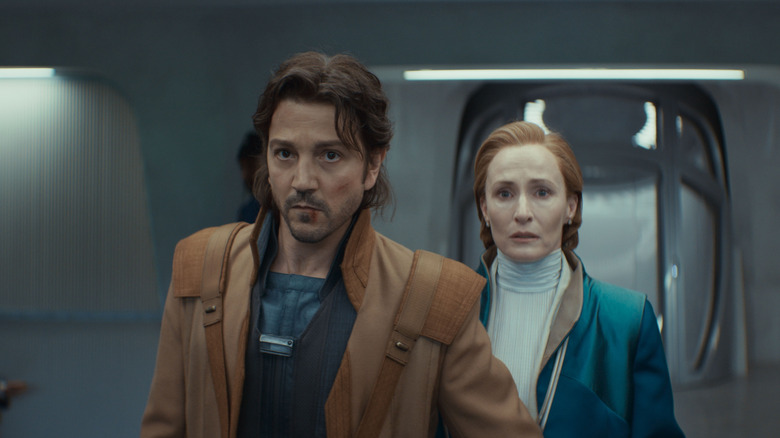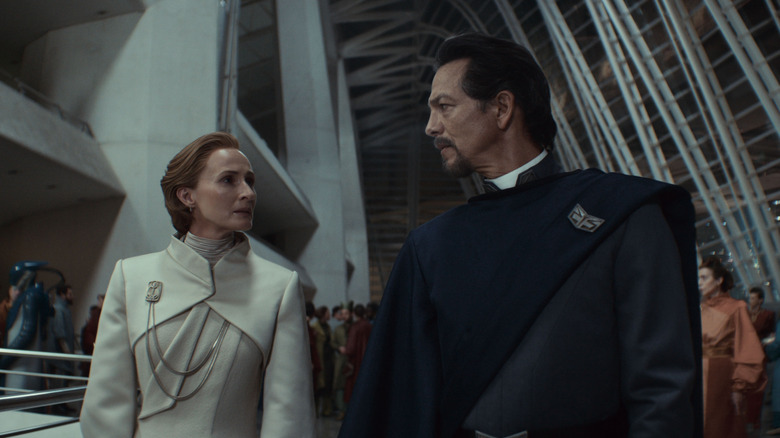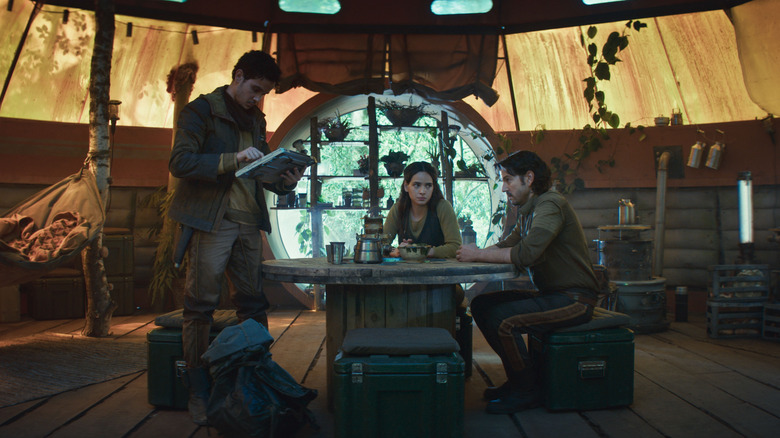Andor Is Closer To George Lucas' Original Star Wars Vision Than Many Fans Realize
Warning: This article contains spoilers for the entirety of "Andor" season 2.
With the dramatic finale of "Andor" season 2, the book has officially closed on what may well go down as the best and most brilliant installment of "Star Wars" we'll ever see. If that seems like a bold claim to make before the smoke has even begun to clear, well, it's only a natural reaction to what we've been watching with our own eyes since this show first started its journey on Disney+ streaming in 2022. Creator Tony Gilroy defied the odds and turned what seemed like an obligatory prequel/spinoff show (to an obligatory prequel/spinoff movie, mind you) into by far the most character-driven, politically incisive, and downright mature franchise entry since "The Empire Strikes Back."
But, of course, this is still "Star Wars" that we're talking about, and no "Star Wars" anything will ever escape scrutiny completely — even one with as much undeniable critical and audience acclaim behind it as "Andor" has. If there's any one recurring complaint that detractors point to again and again, it would have to be the (admittedly vague) idea that this grounded, gritty, and thoroughly lightsaber-less series simply doesn't "feel" like "Star Wars." It might be more polished and well-made and take the material far more seriously than any of Dave Filoni's live-action shows ever could ... but where are all the kid-friendly antics, the reassuring sense of humor, or the endless parade of cameos and fan service that we've grown accustomed to from this galaxy far, far away? To some, the praise heaped upon this series isn't just misguided — it's a betrayal of the very spirit of "Star Wars."
Luckily, some old geezer once said something wise about how different perspectives make sense from "a certain point of view," and that couldn't be more relevant when it comes to "Andor." Where some see a stuffy, self-important revolutionary story that just so happens to take place in the "Star Wars" universe, the show's actual greatest strength is that it represents the purest distillation of George Lucas' core ethos yet. Honestly, thank the Maker for "Andor," because we may never see another movie or show that understands "Star Wars" better than this one does.
Andor understands that Star Wars has always been political
You either get it or you don't. "Star Wars" has never been particularly subtle when it comes to its political leanings, what with the Empire being branded in Nazi colors or the presence of an army literally called "Stormtroopers" or pretty much the entirety of "Return of the Jedi" turning into the most blatant anti-Richard Nixon/Vietnam War metaphor ever put to celluloid. But that hasn't stopped countless fans across multiple generations from fundamentally missing the point about a story of scrappy Rebels fighting a fascistic Empire ... and the many, many on-the-nose parallels purposefully meant to make Western audiences more than a little uncomfortable.
one example of the political dimensions of Star Wars is that it is an allegory for how the Vietnamese resistance was able to defeat the US empire, as George Lucas explains herepic.twitter.com/oOsf2cO3QR
— ☀️👀 (@zei_squirrel) August 21, 2022
Enter "Andor" and its almost single-minded focus to put the "War" back in "Star Wars," by any means necessary. It's why the earliest arc during the first three episodes of season 2 involved Diego Luna's Cassian Andor getting caught between Rebel factions too busy fighting each other to even think about working together — all while stranded on Yavin, the very planet that eventually becomes the headquarters for the Rebel Alliance. The same thought process led to arguably the most controversial depictions of outright evil in any "Star Wars" production ever: the attempted rape of Bix Caleen (Adria Arjona) and the Ghorman massacre. And it explains why so much of this show focused on the actions of Senator Mon Mothma (Genevieve O'Reilly) and her attempts to covertly stymie the Empire at every turn in the political arena.
Are all of these examples some of the most provocative material to ever be part of the "Star Wars" brand? Absolutely. Did they raise the ire of some of the most media-illiterate members of the fandom out there? You bet they did. But what could be more faithful to George Lucas' vision than that? Where more widely-accessible projects like "The Mandalorian" or "The Force Awakens" were content to play things safe and merely luxuriate in the standard tropes of the franchise, "Andor" refused to settle for the status quo. It took the trailblazing aspects of the original "Star Wars," the challenging and expectation-defying spirit of "The Empire Strikes Back," and the unapologetic politics of "Return of the Jedi," and channeled them into something fresh and unique. It doesn't get much more "Star Wars" than that, folks.
Andor embraces Star Wars more than you think
It can be both a blessing and a curse whenever a new "Star Wars" production is unleashed upon audiences. Some, like the first season of "The Mandalorian" or the more recent "Skeleton Crew," instantly revitalize the property and wash the bad taste of past misfires right out of our mouths. Others fall victim to the cultural battleground of the social media age, amplifying the loudest and angriest voices at the expense of some of the most ambitious and daring entries yet. (Raise a glass to "The Last Jedi" and the prematurely-canceled "The Acolyte," if you will.) "Andor" somehow exists at the nexus of all of these various attempts, lauded and criticized in some circles for the exact same thing: its stubborn refusal to go along with traditional "Star Wars" expectations.
But what if that's not entirely true? At first blush, an espionage and political thriller series like "Andor" doesn't appear to fit into any of the usual "Star Wars" conventions. The lack of Jedi, avoiding "Glup Shitto" Easter eggs like the plague, and such frequently dark and upsetting subject matter all seem contrary to the PG values of the franchise. However, that narrative should've gone the way of the Death Star over the course of season 2. The show's revolutionary themes, best exemplified by the progression of Andor and the various unsung heroes over the course of both seasons, couldn't be more aligned with Luke Skywalker himself. Tony Gilroy and his creative team even show an unabashed love for legacy characters like Mon Mothma, Bail Organa (Benjamin Bratt) Saw Gerrera (Forest Whitaker), and more — a level of respect and admiration that exceeds that of many a hardcore fan. And with the long-awaited introduction of the Force into this otherwise agnostic storyline, implying that Andor is on a mission of destiny that cannot be tossed aside or thwarted, "Andor" proves beyond a doubt that it has a deep and abiding passion for what makes "Star Wars," well, "Star Wars."
It may come in an unfamiliar package. The journey along the way might not have been the most straightforward one. But, in the end, "Andor" will go down as one of the most integral additions to "Star Wars" ever ... and the return to George Lucas' original intentions we needed more than ever.


